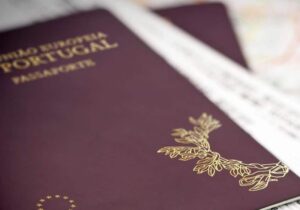The benefits of Portuguese citizenship are increasingly sought after due to the country’s accessible and inclusive immigration laws, inviting foreign nationals to start anew in a welcoming environment. With its rich cultural heritage and high quality of life, it’s no surprise that many people are looking into how to get Portuguese citizenship.
Non-EU citizens can obtain Portuguese nationality through several pathways, each offering the chance to enjoy the benefits of European Union citizenship, including the freedom to work, live, study, and travel across the Schengen Area and all EU countries, unlocking a world of opportunities.
This comprehensive expert Portugal citizenship guide offers valuable insights on:
Portuguese Citizenship is One of the Best in the World

The cost of living in Portugal is much lower than in the US. Housing, which is a major expense for many families, is more affordable in Portugal, whether renting or buying. In big cities like Lisbon and Porto, housing costs are usually much less than in major US cities like New York or San Francisco.
Healthcare in Portugal is also impressive. The country has a public healthcare system that offers care for free or at a low cost to residents and citizens. In contrast, the US healthcare system is one of the most expensive in the world, with high insurance costs, co-pays, and out-of-pocket expenses that can be hard to manage.
Even private healthcare in Portugal, which many expats choose for faster service, is affordable and easy to access. This means that Portuguese citizens can get the medical care they need without the financial stress often faced in the US.
Benefits of Portugal Citizenship
Portuguese citizenship offers a more affordable and equitable lifestyle compared to the US, with accessible and high-quality public services that enhance the quality of life for residents while alleviating financial pressures. Here is a closer look at the benefits of becoming a Portuguese citizen:
Visa-free travel and EU perks: One key benefit is visa-free travel or visa-on-arrival access to 190 destinations worldwide. As a citizen of Portugal, a European Union country, you gain the freedom to travel and reside in any EU or European Economic Area (EEA) country without needing additional visas.
Right to live and work in the EU: Portuguese citizenship grants you the right to live and work in any EU country, providing access to numerous opportunities within a stable economy.
Access to quality healthcare and education: Portuguese citizenship allows you to benefit from Portugal’s robust healthcare system and high-quality education. Portuguese nationals can also access free education and government-sponsored health care programs.
High quality of life and affordable living: Portugal offers a high quality of life characterized by its pleasant climate, safe environment, rich cuisine, and cultural heritage. It also has a relatively lower cost of living than other EU countries, making it an appealing choice for many, including US and UK citizens.
Employment opportunities: A Portuguese passport is your permanent identity, allowing you to seek full-time or part-time employment without additional work permits.
How to Get Portuguese Citizenship
Multiple pathways are available to obtain Portuguese citizenship, depending on your circumstances. Here’s a breakdown of the key routes, as stipulated by the Portuguese government:
1. Portuguese citizenship through marriage
You can apply for Portuguese citizenship if you are married to or in a non-marital relationship with a Portuguese citizen for at least three years. There is no minimum residency requirement for this route. Your application remains valid even if you later divorce or separate.
To apply for citizenship, you must provide documents proving your relationship, such as a marriage certificate, and demonstrate your integration into the Portuguese community. This route offers a straightforward way to become a Portuguese citizen without requiring investment or extended residency.
2. Portuguese citizenship by descent
You can acquire Portuguese citizenship by descent with at least one Portuguese parent. The Portuguese Nationality Law recognizes nationality through jus sanguinis (descent). To obtain Portuguese citizenship by descent, you must present your parent’s birth certificate showing their birth in Portugal.
If you have at least one Portuguese grandparent, you can also apply for citizenship by descent, provided you can supply the necessary documentation, such as your grandparent’s birth certificate. This process underscores the importance of heritage in Portuguese nationality law.
3. Portuguese Citizenship for Sephardic Jews
Sephardic Jews whose ancestors were expelled from the Iberian Peninsula during the Inquisition have the opportunity to claim Portuguese citizenship for Sephardic Jews. To be eligible, you must trace your ancestry to show Sephardic Jewish heritage with documents such as marriage, death, or birth certificates.
This pathway allows individuals with a Portuguese heritage to reconnect with their roots and gain Portuguese nationality. The Portuguese government has provided this route to right historical wrongs, reflecting its commitment to its national cultural heritage.
4. Naturalization
Foreign nationals can acquire Portuguese citizenship through naturalization after residing in Portugal for more than five years and demonstrating proficiency in the Portuguese language. This route provides a structured pathway for individuals seeking to integrate fully into Portuguese society.
The five-year residency requirement can be waived for those married to or in a de facto union with a Portuguese citizen. Applicants in this category must typically provide birth certificates for both parties involved. Popular options include the Portugal D3 Visa for non-EU nationals with specialized qualifications and the Portugal D7 Visa for non-EU citizens with a steady income from pensions, rental income, or investments.
Portugal Citizenship By Investment
Portugal’s citizenship by investment program, known as the Portugal Golden Visa, provides non-EU nationals with a pathway to Portuguese residency and citizenship. This program offers a range of investment options, allowing Portugal Golden Visa applicants and their families to live, work, and study in Portugal while enjoying visa-free travel within the Schengen Area.
By holding the Portugal Golden Visa for five years, foreign nationals may apply for permanent residence and later for Portuguese citizenship.
Portugal Golden Visa eligibility criteria
To qualify for the Portuguese Golden Visa, applicants must be a non-EU, non-Swiss, or non-EEA national, have a clean criminal record, and make a minimum investment in one of the approved fund subscriptions. As a Golden Visa holder, you are only required to spend seven days per year in Portugal, totaling 14 days within the first two years.
How to Apply for Portuguese Citizenship: A Step-by-Step Guide

- Fill out the required application form for Portuguese citizenship.
- Provide all necessary documents and pay the application fees. The required documents are below.
- Submit your completed application and supporting documents to the Portuguese consulate (if applying from abroad) or the Registry Office (if applying from Portugal).
The Registry Office will review your application to determine if you meet the eligibility criteria for Portuguese citizenship. If your application is rejected, the Registry Office will notify you with an explanation. If approved, you will receive an official letter confirming your Portuguese citizenship.
Required documents
To apply for Portuguese citizenship, you need to submit several key documents, including:
- Clean criminal record: Obtain a certificate confirming you don’t have significant criminal convictions. This should be issued by the Agency for Integration, Migration, and Asylum (AIMA), which has replaced SEF (Serviço de Estrangeiros e Fronteiras) in handling immigration matters.
- Clean health record: Provide a health certificate indicating that you are in good health and do not have any serious or communicable diseases.
- Proof of Portuguese residency: If applying through the naturalization route, submit evidence of your legal residency in Portugal. This includes documentation such as a residence permit, utility bills, rental agreements, or other official records demonstrating that you have lived in Portugal for the required period, as stated above.
- Fluency in Portuguese: Show proof of Portuguese proficiency, for example, by passing the CIPLE (Certificado Inicial de Português Língua Estrangeira) test or providing equivalent evidence. Note that applicants from former Portuguese colonies where Portuguese is an official language may be exempt from this requirement.
You’ll also need to present a completed Portugal citizenship application form, a valid passport (proof of identification), and proof of payment for the application processing fee.
How to obtain a Portuguese passport
Once you have Portuguese citizenship, you can apply for a Portuguese passport. Here’s the process:
- Visit a local office: Visit a local citizen’s shop (Loja do Cidadão) or a registry office (Conservatória do Registo Civil) in Portugal. If abroad, visit the nearest Portuguese consulate.
- Provide documentation: Submit necessary documents, including a valid ID (citizen’s card or identity card), two recent color photographs, and a valid Portuguese passport if you have one.
- Pay the fee: Pay the required application fee.
Your passport application will be processed and, if approved, issued within a few days in Portugal or a few weeks abroad. Portuguese law requires dual citizens to use a Portuguese passport to enter and exit Portugal.
What is the Portuguese language test?
If you have been legally living in Portugal for five or more years and want to apply for citizenship, you must demonstrate that you are proficient in Portuguese and can read, write, and comprehend the language. There are several ways in which this can be done, with the most common being passing an A2-level Portugal Golden Visa Language Test and including the certificate in your citizenship application.
A popular route among expats is the Certificate of Portuguese as a Foreign Language (CIPLE), certified through the Centro de Avaliação e Certificação de Português Língua Estrangeira (CAPLE), a division of Lisbon University’s Faculty of Letters. Another institution through which you can take the Portuguese language test is the Instituto de Avaliação Educativa (IAVE).
The CIPLE attests to a basic general ability to interact in a limited number of predictable everyday situations of communication. It corresponds to level A2 of the Common European Framework of Reference for Languages: Learning, Teaching, Assessment of the European Council, and there is a school version aimed at young people aged between 12 and 15 years old as well.
To be clear, you don’t need to pass the CIPLE test specifically, as according to the Portuguese government website, the mandatory document that proves that you have sufficient knowledge of the Portuguese language can be:
- a certificate of qualification from a Portuguese public, private, or cooperative educational establishment
- a certificate of approval in a Portuguese language test
- a certificate of Portuguese as a foreign language, which is obtained by taking a test at a Portuguese assessment center recognized by the Ministry of Education through the Portuguese as a Foreign Language Assessment Centre (CAPLE)
Exemptions in submitting the test for citizenship
- Individuals applying through a marriage or partnership of at least three years to a Portuguese national aren’t explicitly required to prove their knowledge of Portuguese (as they only need to prove a connection to the Portuguese community), but getting the certificate certainly helps. An effective connection to the Portuguese community is automatically recognized if one of the documents included in the application is proof of “having been legally resident in Portugal for at least 3 years and prove that you are studying in Portugal or prove knowledge of the Portuguese language.”
- If you were born in a Portuguese-speaking country and have nationality from that country, you do not need to present documents to prove your knowledge of Portuguese. These include countries such as Brazil, Angola, and Mozambique.
What is the cost of applying for Portugal citizenship?

- Application fee: Approximately €175. This is the standard fee for processing the citizenship application.
- Criminal record certificate: Obtaining a clean criminal record certificate can cost between €25 and €50, depending on the issuing authority and whether it needs to be translated.
- Health certificate: The cost of obtaining a health certificate varies but generally ranges from €20 to €50, depending on the medical provider.
- Language test: The CIPLE language test costs approximately €72.
- Translation and notarization: Additional fees will apply if any documents need to be translated or notarized. Translation costs vary widely but generally around €30 to €100 per document.
- Legal fees: If you use a lawyer or immigration consultant to assist with your application, their fees will add to the total cost. These fees can range from €500 to €1,500, depending on the complexity of the case and the services provided.
Portugal Citizenship Processing Time
The processing time for Portuguese citizenship applications generally falls within the following ranges:
- Processing time: Typically between 6 to 12 months from the date of application submission. This timeframe can vary based on the complexity of the application and the volume of applications being handled.
- Expedited processing: Expedited processing may be available in certain cases, but it is rare and usually reserved for exceptional circumstances.
- Delays: Processing times may be extended if additional documentation or information is required or if there are issues with the application that need to be resolved.
For the most accurate and current Portugal citizenship application processing times, it is advisable to consult with your local Portuguese consulate. They can provide detailed information based on the latest updates and your specific application circumstances.
Dual Citizenship in Portugal
Portugal supports dual citizenship, allowing individuals to retain their original citizenship while also acquiring Portuguese citizenship.
This legal status enables citizens to hold nationality in both Portugal and another country concurrently. While Portugal does not have specific dual nationality agreements with other nations, it generally permits dual citizenship, including with countries like the United States.
Working With an Immigration Lawyer for Your Portugal Citizenship

A Portugal immigration lawyer can evaluate your eligibility for Portuguese citizenship, advise on the most suitable route, and help address potential challenges. They ensure your application meets all legal requirements and is thoroughly complete, including those related to legal residence.
Citizenship applications often involve extensive documentation. Portuguese immigration lawyers assist in gathering and preparing the necessary paperwork, minimizing the risk of errors or omissions.
Why choose Global Citizen Solutions for your Immigration Visa?
GLOBAL APPROACH BY LOCAL EXPERTS
- GCS has offices located across Portugal.
- Members of the US-Portugal and UK-Portugal Chambers of Commerce in Portugal, and the Investment Migration Council (IMC).
- Our expert team can help you throughout your journey to secure your Visa.
100% APPROVAL RATE
- Our successful track record in applications provides reassurance to applicants.
- We have helped clients from more than 35 countries secure residency in Portugal.
ALL-ENCOMPASSING SOLUTION
- With a single channel of communication, our approach ensures that you have complete clarity on your application.
- Our BeGlobal® Onboarding System allows for a total flow of information.
TRANSPARENCY AND PRIVACY
- Our pricing is clear and detailed, you will not face any hidden costs.
- All data is stored within a GDPR-compliant database on a secure SSL-encrypted server.

Frequently Asked Questions About Portuguese Citizenship
Can a US citizen get citizenship in Portugal?
Yes, a US citizen can acquire Portuguese citizenship through several common routes. These include:
- Five years of legal residence in Portugal after obtaining a visa.
- Marriage to a Portuguese citizen.
- Investment in Portugal under the Golden Visa Program.
- Portuguese ancestry, which may qualify you for citizenship based on descent.
Contact your local immigration service authority for more info.
Does Portugal give citizenship easily?
Obtaining Portuguese nationality involves meeting specific requirements and navigating complex legal procedures. Portugal offers various pathways to citizenship, such as through ancestry, having a Portuguese parent, marriage, or investment (excluding real estate).
Additionally, you can qualify for dual citizenship after five years of legal residence in Portugal. Compared to many countries, these options make Portugal’s process relatively accessible.
How do I get dual Portuguese citizenship?
To obtain dual Portuguese citizenship, you must first qualify through routes such as five years of legal residency in Portugal, marriage to a Portuguese national, Portuguese descent, or significant investment (Golden Visa Program).
After meeting these requirements and receiving approval for Portuguese citizenship, you can hold dual citizenship, provided your current country permits it. Always verify the dual citizenship rules of your current country before applying.
Can a US citizen have dual citizenship with Portugal?
A US citizen can obtain Portuguese citizenship, as both countries allow dual nationality. This process can be achieved through descent, marriage, birth, or by legally residing in Portugal for six years, including one year with a permanent residence permit.
How good is Portuguese citizenship?
Obtaining Portuguese citizenship is attractive to many people because the Portuguese passport is one of the strongest in the world, granting visa-free or visa-on-arrival access to 190 countries and you can live and work in any of the 29 EU countries without needing a visa.
How do you become a citizen of Portugal?
According to the Portuguese nationality law, the main pathways to Portuguese citizenship are:
- Birth or descent (such as Sephardic Jewish ancestry)
- Naturalization (after five years of legal residency)
- Investment (followed by naturalization)
- Marriage or de facto union
Do I need to speak Portuguese to obtain citizenship?
Yes. Applicants are required to take the CIPLE exam. This Portuguese language test examines your ability to understand and use everyday Portuguese expressions. To take the test, you are required to both write and speak the language at an A2 level.
What is the Portugal Citizenship test?
The Portugal Citizenship test evaluates Portuguese language proficiency and knowledge of Portuguese culture, typically required by the Portuguese government for citizenship applicants.
How does the Golden Visa program relate to Portuguese Citizenship?
The Portugal Golden Visa program allows non-EU citizens to acquire citizenship through eligible minimum investment programs or opportunities in Portugal.
Can I lose my Portugal citizenship if I live abroad?
Specific minimum stay requirements must be met within the first five years of living in Portugal as a non-EU citizen. Once you have received your citizenship, be it via venture capital funds, marriage certificate, birth certificate, or Portugal’s Golden Visa, you’re free to live outside of Portugal without risk of losing your citizenship.
How to expedite the citizenship process in Portugal?
Hiring an immigration lawyer can help streamline the process and ensure all documents are correctly submitted. Whether you’ve opted for citizenship by investment or another route, immigration lawyers can assist.
Are there citizenship lawyers in Portugal?
Yes, there are citizenship lawyers in Portugal who can assist with the application process, including issues related to Portuguese citizenship by investment, tax laws and other elements required as per the Portuguese government.
How does Portugal's citizenship law compare to other EU countries?
Portugal’s citizenship law is generally more accessible compared to many EU countries, offering various pathways such as residency, descent, and marriage, as determined by the Portuguese government.
What are common challenges faced when applying for citizenship in Portugal?
Common challenges include meeting residency requirements, proving integration into Portuguese society, and navigating the documentation process, often requiring assistance from legal experts or the Portuguese government.
Can I pass Portuguese citizenship to my children?
Yes, as a Portuguese citizen, you can pass your citizenship to your children under several conditions. Portuguese nationality law allows for the transmission of citizenship to descendants, but the specific requirements depend on whether the child is born in Portugal or abroad and on the parents’ circumstances. If you are a Portuguese citizen and your child is born abroad, the child is entitled to Portuguese citizenship by descent.
What are the Portugal Citizenship eligibility and requirements?
Citizenship options in Portugal have differing eligibility and criteria. However, to start your journey to Portuguese citizenship, here are the basic criteria you need to know:
- The primary applicant must be at least 18 years old.
- You need a legal route to apply for citizenship, such as living in Portugal for at least five years on a visa, whether as a worker or retiree. Alternatively, you can qualify through your parents’ or grandparents’ birth certificates but only if they had Portuguese citizenship.
- Ensure you are eligible for dual citizenship from your home country and possess a valid passport.


